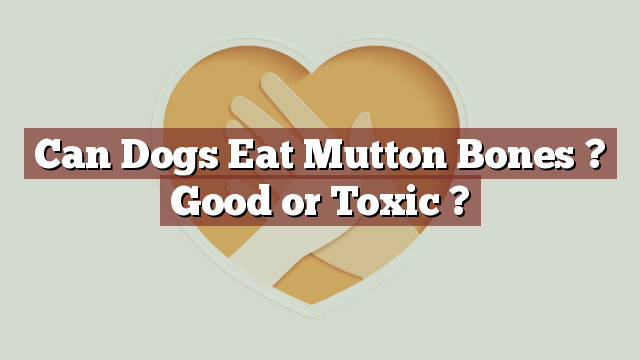Can Dogs Eat Mutton Bones? Good or Toxic?
As responsible pet owners, it is crucial to be aware of what foods are safe for our furry friends. Can dogs eat mutton bones? The answer to this question is no, dogs should not eat mutton bones. While mutton bones may seem like a tempting treat for our canine companions, they can pose serious health risks. In this article, we will delve into the nutritional value of mutton bones, explore the safety and toxicity factors, discuss potential risks or benefits, provide guidance on what to do if your dog consumes mutton bones, and ultimately provide expert recommendations on this matter.
Nutritional Value of Mutton Bones: Does It Provide Any Benefits to Dogs?
Mutton bones primarily consist of bone and cartilage. These components are rich in essential minerals, such as calcium and phosphorus, which are vital for maintaining healthy bones and teeth. Additionally, bones can provide mental stimulation and help keep your dog’s teeth clean by reducing plaque buildup. However, it is important to note that the nutritional benefits of mutton bones can be obtained through safer alternatives.
Can Dogs Eat Mutton Bones: Exploring the Safety and Toxicity Factors
Despite the potential nutritional benefits, it is crucial to recognize the safety concerns associated with feeding mutton bones to dogs. Mutton bones can splinter easily, posing a significant choking hazard. The sharp fragments can cause tears or blockages in the digestive tract, leading to severe injuries or requiring surgical intervention. Furthermore, chewing on hard bones can cause dental fractures, which can be painful and result in infections.
Scientific and veterinary insights consistently warn against feeding dogs mutton bones due to these safety hazards. The risks outweigh any potential benefits, making it essential to avoid giving mutton bones to dogs altogether.
Potential Risks or Benefits of Dogs Consuming Mutton Bones
The potential risks of dogs consuming mutton bones are significant. As mentioned earlier, these bones can splinter easily and cause choking, blockages, or dental injuries. Moreover, the consumption of mutton bones can lead to pancreatitis, a potentially life-threatening condition characterized by inflammation of the pancreas. The high fat content in mutton bones can trigger this condition in dogs, causing symptoms like vomiting, diarrhea, and abdominal pain.
On the other hand, the potential benefits of feeding mutton bones are limited compared to the potential risks involved. Dogs can obtain the necessary minerals and dental benefits from safer alternatives, such as specially formulated dental chews or toys.
If Your Dog Eats Mutton Bones: Steps to Take and Signs to Watch for
If your dog accidentally consumes mutton bones, it is crucial to take immediate action. Monitor your dog closely for any signs of distress, including choking, difficulty breathing, vomiting, diarrhea, or abdominal discomfort. If you observe any of these symptoms, do not hesitate to contact your veterinarian or an emergency veterinary clinic for guidance. Prompt veterinary attention can be crucial in preventing serious complications and providing the necessary treatment.
Conclusion: The Verdict on Dogs Eating Mutton Bones – Expert Recommendations
In conclusion, the answer to the question, "Can dogs eat mutton bones?" is a resounding no. While mutton bones may offer some nutritional benefits, the potential risks associated with them far outweigh any advantages. The splintering nature of mutton bones poses a choking hazard, digestive blockages, and dental injuries that can have severe consequences for your beloved pet. It is best to prioritize your dog’s safety and well-being by offering alternative, safer options for chewing and obtaining essential nutrients.
Always consult with your veterinarian for suitable and safe alternatives that can provide the necessary dental stimulation and mineral supplementation while avoiding the potential dangers of mutton bones. By making informed choices, we can ensure our dogs lead happy and healthy lives.
Thank you for investing your time in exploring [page_title] on Can-Eat.org. Our goal is to provide readers like you with thorough and reliable information about various dietary topics. Each article, including [page_title], stems from diligent research and a passion for understanding the nuances of our food choices. We believe that knowledge is a vital step towards making informed and healthy decisions. However, while "[page_title]" sheds light on its specific topic, it's crucial to remember that everyone's body reacts differently to foods and dietary changes. What might be beneficial for one person could have different effects on another. Before you consider integrating suggestions or insights from "[page_title]" into your diet, it's always wise to consult with a nutritionist or healthcare professional. Their specialized knowledge ensures that you're making choices best suited to your individual health needs. As you navigate [page_title], be mindful of potential allergies, intolerances, or unique dietary requirements you may have. No singular article can capture the vast diversity of human health, and individualized guidance is invaluable. The content provided in [page_title] serves as a general guide. It is not, by any means, a substitute for personalized medical or nutritional advice. Your health should always be the top priority, and professional guidance is the best path forward. In your journey towards a balanced and nutritious lifestyle, we hope that [page_title] serves as a helpful stepping stone. Remember, informed decisions lead to healthier outcomes. Thank you for trusting Can-Eat.org. Continue exploring, learning, and prioritizing your health. Cheers to a well-informed and healthier future!

